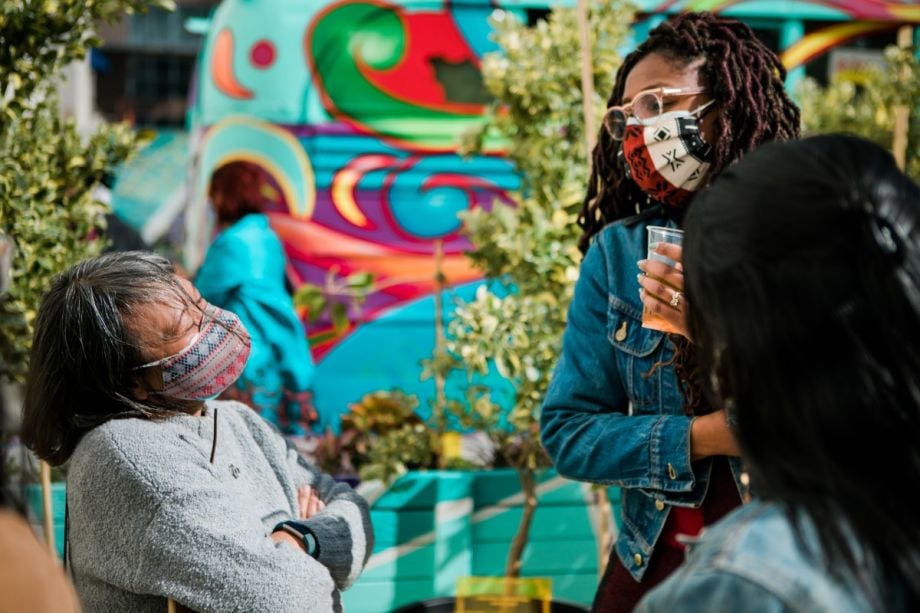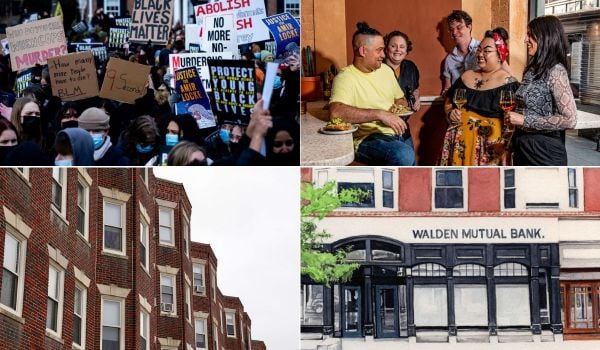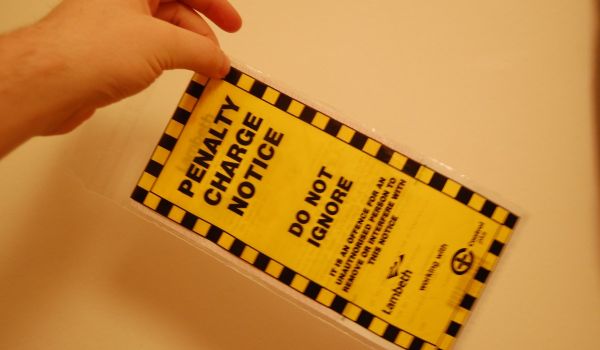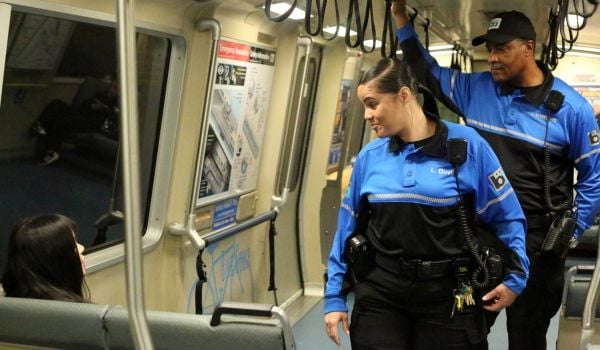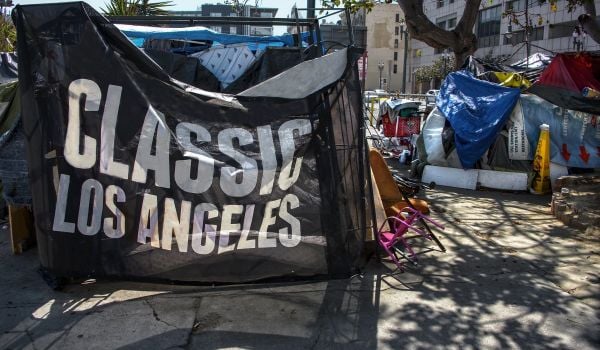Desi Danganan had a clear vision in transforming the former parking lot at 967 Mission Street in San Francisco. The Filipino community activist and SoMa resident, who is a driving force behind the area’s cultural district, SOMA Pilipinas, envisioned an active space with a basketball court, food trucks and surrounding murals.
Then COVID-19 hit. “Full-contact sports were basically illegal at that point, gathering people was illegal,” he recalls. “We decided not to fight COVID and just design the space for COVID.”
The result is Kapwa Gardens, which opened this April complete with greenery, techno-colored gathering spaces and a revamped jeepney bus (that will be transformed into office space and a sound booth) painted with a massive bird’s head. It is designed to help the neighborhood “recover from the devastating mental, physical, and economic effects of COVID-19,” according to the website. It is also the latest offering within a growing cultural district anchoring a Filipino-centered commercial corridor on Mission, a gentrifying block of the city.
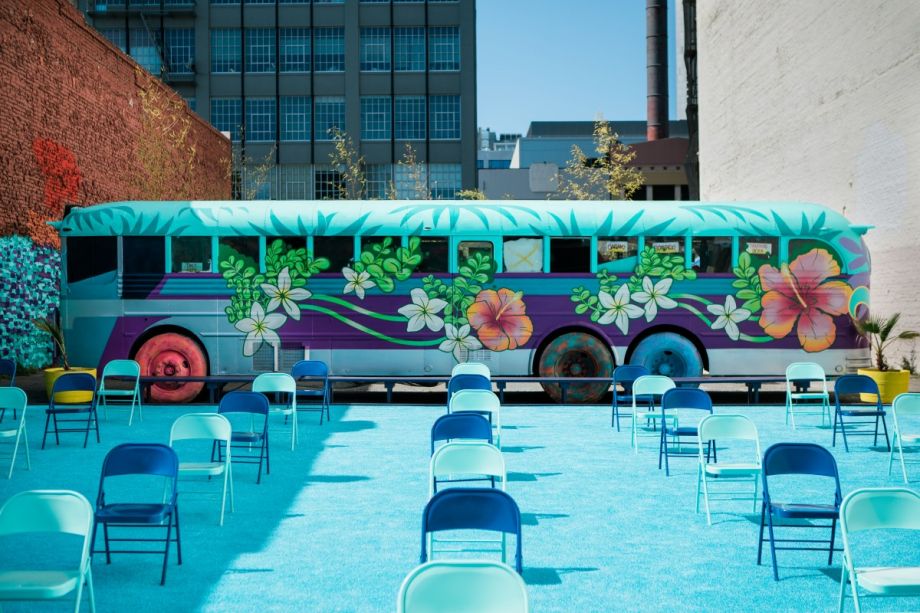
Kapwa Gardens revamped jeepney bus (Photo by Manalo Pictures, courtesy Kapwa Gardens)
The city recognized SOMA Pilipinas in 2016; the cultural district honors and showcases the 120-plus-year history of Filipinos in San Francisco. Danganan, who sits on a working group of SOMA Pilipinas and founded the local nonprofit incubator Kultivate Labs, began hosting a series of night markets and holiday pop-ups known as UNDSCVRD SF to highlight the area.
He saw a major opportunity at 967 Mission, which had been a parking lot for decades. As part of a massive real estate development nearby, the city gained possession of the 8,777-square-foot lot and issued an RFP in the fall of 2019 to activate it. Kultivate Labs had already built and activated a two-month gathering space and basketball court known as the UNDSCVRD Court in a city-owned lot a few blocks away. The city issued the RFP to Kultivate to build out a more permanent community space here.
The UNDSCVRD Court was considered an early prototype for Kapwa Gardens. (Kapwa in Tagalog translates roughly to neighbor.) Kultivate Labs, in partnership with CAMO Studio, also led community engagement with residents, seniors and a local school to brainstorm potential designs.
COVID-19 paused community engagement, but because there are few public gathering spaces in the neighborhood, the team didn’t want to give up. “We couldn’t do anything we were planning on doing, but we needed to do something,” says Marcus Owens, cofounder of CAMO. “It was going to be much more of an active space pre-COVID, with an adventure playground and basketball hoop, and it turned into a totally peaceful, calm, Calamansi grove.”
The team decided on ample greenery — Calamansi trees are native to the Philippines and considered a medicinal plant — against bright colors for the space and surrounding artwork. “Calamansi trees are really special for a lot of folks, because we don’t have spaces to grow them in our own homes,” says Kimberley Acebo Arteche, who curates the art component of the garden. As for the giant bird painted on the repurposed school bus, “It’s a Sarimanok, a kind of mythical creature that weaves together everyone’s wishes and dreams,” she says.
There were also design and programming considerations for safety. Kapwa Gardens was designed to hold 56 people, socially distanced, and the team developed in-house contact tracing for visitors.
With a limited budget, Kultivate Labs organized a team of volunteers who built out the space over several months. “It was part of a mental health reduction, being able to give people a safe place to gather and put their minds to something other than Zoom,” Danganan says. The request for volunteers resonated widely — about 350 people helped build out the garden, traveling from as far as San Jose. 65 percent of volunteers were non-Filipino, according to Danganan. “It shows the work we’re doing doesn’t just appeal to Filipinos,” he notes.
Kapwa Gardens opened in April with limited entry to maintain social distancing, temperature checks, contact tracing and hand sanitizer throughout. It also hosted weekly COVID-19 testings. Alongside quiet gathering spaces, an open court hosts socially-distant activities like yoga, dance and self-defense classes. Throughout the build-out and opening, there have been no COVID-19 outbreaks linked here, according to Danganan.
Kultivate Labs also wanted to be mindful as San Francisco moved out of its shelter-in-place mandates. When the city’s mask restriction lifted, the team surveyed community members about lifting mask restrictions inside Kapwa Gardens. (Masks are now optional.) Kultivate will increasingly host food trucks, vendors and programming as part of the economic recovery for Filipino business owners. “We have to really slow-roll it, as a recovery space,” Danganan says. Still, he adds, “We see Kapwa Gardens as part of the recovery of SOMA Pilipinas.”
Kapwa Gardens will be used to test ideas and programming for the area’s future cultural center, Balay Kreative. It won’t open until 2025, but Danganan believes the lessons from designing, building and opening a community space during the pandemic will strongly resonate.
“Everyone talks about the exodus from San Francisco … our community, we chose to adapt,” he says. “That’s just been part of the DNA of the Philippines, and that resilience is part of the Filipino-American culture here.”
This article is part of “For Whom, By Whom,” a series of articles about how creative placemaking can expand opportunities for low-income people living in disinvested communities. This series is generously underwritten by the Kresge Foundation.

Emily Nonko is a social justice and solutions-oriented reporter based in Brooklyn, New York. She covers a range of topics for Next City, including arts and culture, housing, movement building and transit.
Follow Emily .(JavaScript must be enabled to view this email address)

